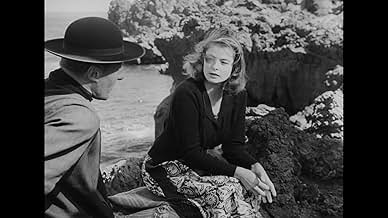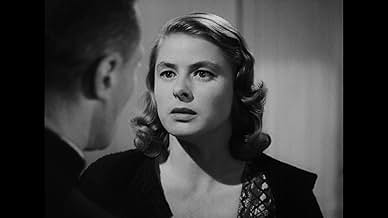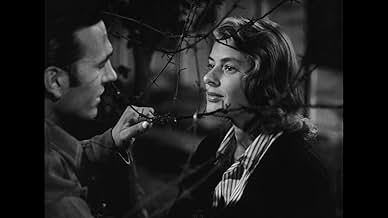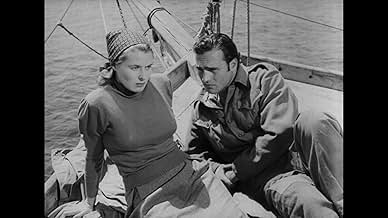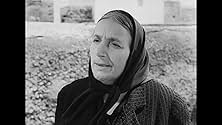NOTE IMDb
7,2/10
8,5 k
MA NOTE
Karen, une jeune femme de la Baltique, épouse Antonio, un pêcheur pour échapper à un camp de prisonniers, mais la vie dans le village d'Antonio, Stromboli, menacé par le volcan, est difficil... Tout lireKaren, une jeune femme de la Baltique, épouse Antonio, un pêcheur pour échapper à un camp de prisonniers, mais la vie dans le village d'Antonio, Stromboli, menacé par le volcan, est difficile et Karen ne parvient pas à s'y faire.Karen, une jeune femme de la Baltique, épouse Antonio, un pêcheur pour échapper à un camp de prisonniers, mais la vie dans le village d'Antonio, Stromboli, menacé par le volcan, est difficile et Karen ne parvient pas à s'y faire.
- Réalisation
- Scénario
- Casting principal
- Récompenses
- 2 victoires et 1 nomination au total
Avis à la une
7cogs
"Stromboli" is a fascinating examination of suffering, desperation, faith and the desire for redemption. I've never liked Rossellini's films as much as Bresson's but I think the two directors often dealt with the same themes in similar ways, with minor stylistic variations. Where Rossellini used actors and non-actors who gave performances, Bresson used models and types who were instructed to remain impassive. Where Rossellini's films focused on passionate characters and emotional situations, Bresson approached his stories with a scientist's dispassion. I've always found Rossellini's films strange they are often parables that invest heavily in domestic melodrama and the histrionics of their characters. Nevertheless, I think "Stromboli" is one of his most successful films. Karin suffers so much--a war refugee, internment camp resident and then harried wife and social pariah on a desolate island--that it is easy to see how she is blind to faith. Despite her eventual redemption Rossellini doesn't paint Karin as a saint. Her protestations regarding the social politics of the island develop into a crusade to transgress their customs and protocols, often in self-righteous objection to the constraints placed on her. And her willingness to exploit her sexuality further confirms her all too human (and flawed) nature. The scenes where Karin attempts to seduce the priest and later seduces the lighthouse keeper are brimming with carnal sensuality. Bergman, as always, is excellent.
Even in a displaced persons camp, Ingrid Bergman, as Karen, a Lithuanian refugee, manages to dress better and look more beautiful than everyone around her. After her petition for passage to Buenos Aires is denied, she marries a POW from the adjacent camp. A native of the Italian volcanic island Stromboli, Antonio - Mario Vitale - brings her to his home. The village is a harsh place carved from the cinders of the mountainside, and half-deserted. As soon as she sets foot on the island, she can see she's made a mistake, but instead of accepting what she bargained for, she pesters Antonio to make more money so they can leave. He doesn't want to go - this is his home, and he is content even with this fussy wife. The men are fishermen, she constantly hears crying children, and the women dislike her immodesty. She redecorates the house, hiding his shrine and old photographs, putting out vases and flowers, turning her floral dresses into bright curtains. But she disregards the social rules, befriending a seamstress who's a "fallen woman" and playing in the sea with a group of boys. The inevitable clash between the peasant fisherman and the woman with aesthetic aspirations their simple life cannot satisfy, comes to a head with the eruption of the volcano. If I rated only the plot, this movie would earn a 5 - but the cinematography is magnificent. Otello Martelli's use of light and shadow, camera angle, and the restless natural world he filmed, create images that last long after the story has blown away like the fluff it is.
Stromboli is a film with the look of Flaherty's `Man of Aran' and the dramatics of von Trier's `Breaking the Waves'. The story is the tragedy of a woman named Karin, a Lithuanian refugee after WWII and her pursuit of a better life marrying an Italian peasant and moving down with him to his birthplace, a volcanic island off the coast of southern Italy.
Rossellini portraits her heroin without sentimentalism or affection of any kind. He seems to be more interested in revealing her dark sides and miseries, but as Bergman's performance is so emotionally raw, we cannot but stick with her to the end of her journey. We do not pity her, but take pity with her. Rossellini's strong Catholicism usually forces us to live through his films as Catholics, regardless of which belief one may have.
If war was hell then the post war can be redemption time. Karin has nostalgia of her past, a lost-paradise, and all her efforts are put to restore that primal state. She's an Eva cast away from Eden, with somehow Bovarian ambitions, trying to reach prosperity at any cost. Her chances are scarce, so she takes the only opportunity she gets to leave the camp, marrying Antonio, a peasant whom she first kisses through barbed wire. She will soon realize that Antonio's island is miles away of the paradise of her dreams. The place is barren and the locals are hostile. She's trapped in a labyrinth surrounded by sea and menaced by an active volcano. Any form of relationship, even with her husband, is impeded because of a communication problem. Technically she cannot speak the language. But she cannot either penetrate a hermetic, oppressive world ruled by rites and tradition. If paradise was a state where men could speak the language of the gods in harmony with nature, Karin's pilgrimage will ultimately have to restore that dialogue, rebuild that bridge with origin.
In her symbolic descent to primitivism she learns the meaning of life in the hard way, and at the same time she follows all the phases of mankind from the first cry of the new born, to subsequent life in a cavern, cave-painting, elemental worshipping, fishing for subsistence and conversion. Karin's fault is her self-sufficiency, denying the existence of a superior order and her mundane ambition of a destiny ruled by luxury and comfort. She thinks the place is filthy and defines her belonging to `a different class'. When she realizes that there's no place for glamour in Stromboli she turns into an Eve and tempts the local priest. This behaving sooner or later will provoke the wrath of the gods, portrayed in the everlasting volcano to which the fate of the islanders is attached from immemorial days. To outcome her tragic fall, Karin should ascend the top of the mountain while getting rid of her material belongings (the money, the suitcase), rise up her head to the sky and address God. Rossellini doesn't show us if she saves her life or not because the thing is that she assumed her role of creature and thus her subordination to a supreme kind. Same as the villagers, who stoically accept the infuriated eruptions, or the fishermen that depend on the fruitful sea.
The most unforgettable sequence of the film is the one of the tuna fishing. Rossellini is so precise in the choosing of the images and the rhythm of the editing that the one feels that is seated in one of the boats bringing the prays. But the scene has much more than an aesthetic value. It works not only because it's beautiful; it is also informative for the story, dramatic in itself and in the events of the film, and symbolic both for the story and for Bergman's character, who watches the action from a neighboring boat. Such an adjustment distinguishes art from a good movie.
Rossellini portraits her heroin without sentimentalism or affection of any kind. He seems to be more interested in revealing her dark sides and miseries, but as Bergman's performance is so emotionally raw, we cannot but stick with her to the end of her journey. We do not pity her, but take pity with her. Rossellini's strong Catholicism usually forces us to live through his films as Catholics, regardless of which belief one may have.
If war was hell then the post war can be redemption time. Karin has nostalgia of her past, a lost-paradise, and all her efforts are put to restore that primal state. She's an Eva cast away from Eden, with somehow Bovarian ambitions, trying to reach prosperity at any cost. Her chances are scarce, so she takes the only opportunity she gets to leave the camp, marrying Antonio, a peasant whom she first kisses through barbed wire. She will soon realize that Antonio's island is miles away of the paradise of her dreams. The place is barren and the locals are hostile. She's trapped in a labyrinth surrounded by sea and menaced by an active volcano. Any form of relationship, even with her husband, is impeded because of a communication problem. Technically she cannot speak the language. But she cannot either penetrate a hermetic, oppressive world ruled by rites and tradition. If paradise was a state where men could speak the language of the gods in harmony with nature, Karin's pilgrimage will ultimately have to restore that dialogue, rebuild that bridge with origin.
In her symbolic descent to primitivism she learns the meaning of life in the hard way, and at the same time she follows all the phases of mankind from the first cry of the new born, to subsequent life in a cavern, cave-painting, elemental worshipping, fishing for subsistence and conversion. Karin's fault is her self-sufficiency, denying the existence of a superior order and her mundane ambition of a destiny ruled by luxury and comfort. She thinks the place is filthy and defines her belonging to `a different class'. When she realizes that there's no place for glamour in Stromboli she turns into an Eve and tempts the local priest. This behaving sooner or later will provoke the wrath of the gods, portrayed in the everlasting volcano to which the fate of the islanders is attached from immemorial days. To outcome her tragic fall, Karin should ascend the top of the mountain while getting rid of her material belongings (the money, the suitcase), rise up her head to the sky and address God. Rossellini doesn't show us if she saves her life or not because the thing is that she assumed her role of creature and thus her subordination to a supreme kind. Same as the villagers, who stoically accept the infuriated eruptions, or the fishermen that depend on the fruitful sea.
The most unforgettable sequence of the film is the one of the tuna fishing. Rossellini is so precise in the choosing of the images and the rhythm of the editing that the one feels that is seated in one of the boats bringing the prays. But the scene has much more than an aesthetic value. It works not only because it's beautiful; it is also informative for the story, dramatic in itself and in the events of the film, and symbolic both for the story and for Bergman's character, who watches the action from a neighboring boat. Such an adjustment distinguishes art from a good movie.
"La terra e dura qui." Ingrid Bergman is a powerhouse in this film (perhaps out of love and devotion to the director), but she still can't match the power of the menacing volcano on this remote island off the coast of Italy. Bergman plays a prisoner of war with a checkered past stuck in a women's camp, who marries a Strombolian in order to provide herself with the security she needs. Trouble awaits her, and the first sign we get of that is when she starts to complain of being cold on the boat that is taking her to her new life. What she finds is not up to her high Continental standards, and her attitudes towards the locals and the place itself diminish her already low stature as an outsider. It is less the people however, than the general character of the place that turns her off. The volcano, unnamed by the villagers, always awaits in the background, and setting itself becomes one of the main characters (thus the importance of the title), a force to be reckoned with, much like her character.
Although this film is not noir in any way, and Rossellini himself would probably turn in his grave for hearing me say this, Bergman's character certainly does not hesitate in using her female "wiles" to get what she wants and needs. She survived a world war on what we take are wits and flexible morals, so she will also make it through this and I love her for it.
She even attempts to seduce the local priest by cooing "I knew you were the only person who could help me." Having that attempt fail, she tries with the village lighthouse keeper seen at right, and I don't even have to explain the power of her touch. As she asks for help to escape from the village, she softly touches his foot with hers, and creates an unbelievably palpable feeling of erotic energy, something unheard of in mainstream movies today. I know, that's such a cliché, but it's true.
Anyway, I won't discuss the ending, which angered me as a modern woman (even Bergman didn't seem to be buying it), but I will say that the film impressed me with its use of setting comprising plot, character, mise-en-scene, and theme. The film IS setting. It's also worth it just to see the non-actors performing a yearly tuna fishing ritual that dates back to the Phoenecians. Rossellini films are never just stories, they are historical documents. And I love him for that.
cococravescinema.blogspot.com
Although this film is not noir in any way, and Rossellini himself would probably turn in his grave for hearing me say this, Bergman's character certainly does not hesitate in using her female "wiles" to get what she wants and needs. She survived a world war on what we take are wits and flexible morals, so she will also make it through this and I love her for it.
She even attempts to seduce the local priest by cooing "I knew you were the only person who could help me." Having that attempt fail, she tries with the village lighthouse keeper seen at right, and I don't even have to explain the power of her touch. As she asks for help to escape from the village, she softly touches his foot with hers, and creates an unbelievably palpable feeling of erotic energy, something unheard of in mainstream movies today. I know, that's such a cliché, but it's true.
Anyway, I won't discuss the ending, which angered me as a modern woman (even Bergman didn't seem to be buying it), but I will say that the film impressed me with its use of setting comprising plot, character, mise-en-scene, and theme. The film IS setting. It's also worth it just to see the non-actors performing a yearly tuna fishing ritual that dates back to the Phoenecians. Rossellini films are never just stories, they are historical documents. And I love him for that.
cococravescinema.blogspot.com
I know the Sight And Sound crowd loves it but I find it highly resistible for the same reason they venerate it, namely that watching an hour and forty minutes of Ingrid Bergman's spirit, individuality and, yes, arrogance crushed beneath the heel of complacent Italian peasantry is less than enthralling. Partially making up for this are Rossellini's three visually arresting set pieces, the Catching Of The Tuna and the Volcanic Eruptions. And of course Bergman is captivating, as usual. So, let's give it a B minus. PS...As wonderful as is the cinematography the sound sucks. Could maybe understand 60% of the English dialogue.
Le saviez-vous
- AnecdotesDuring production of this film, Ingrid Bergman entered into an extra-marital affair with Roberto Rossellini and became pregnant, the two eventually getting married and having three children. The resulting scandal in America effectively blacklisted her from the North American movie market and she was even condemned by politicians and religious figures. She was finally forgiven and welcomed back to America upon the success of Anastasia (1956), but her Hollywood career was temporarily ended by this movie.
- GaffesThough used by women, pants were not so popular on that time. Is strange that a poor refugee like the character played by Bergman wears pants almost the entire movie.
- Crédits fousOpening credits: "I was found of them that sought me not; I was made manifest unto them that asked not after me." (New Testament, St. Paul's letter to the Romans, Chapter 10, Verse 20)
- Versions alternativesSeveral running times exist. The main difference between the 81 min. US version and the 105 min. Italian version was in the ending, with religious themes cut out.
- ConnexionsEdited into Histoire(s) du cinéma: Une histoire seule (1989)
Meilleurs choix
Connectez-vous pour évaluer et suivre la liste de favoris afin de recevoir des recommandations personnalisées
- How long is Stromboli?Alimenté par Alexa
Détails
- Date de sortie
- Pays d’origine
- Langues
- Aussi connu sous le nom de
- Stromboli, terre de Dieu
- Lieux de tournage
- Sociétés de production
- Voir plus de crédits d'entreprise sur IMDbPro
Box-office
- Budget
- 1 000 000 $US (estimé)
- Montant brut mondial
- 17 532 $US
- Durée1 heure 43 minutes
- Couleur
- Rapport de forme
- 1.37 : 1
Contribuer à cette page
Suggérer une modification ou ajouter du contenu manquant



